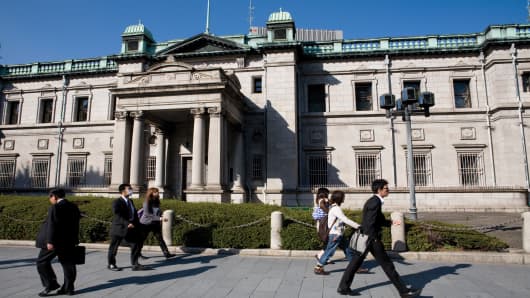Some members of the Bank of Japan's policy board expressed concerns that increased purchases of government debt could actually impair financial markets and discourage bank lending, minutes of their April 3-4 meeting showed.
The April 3-4 meeting crowned a two-week whirlwind of meetings and hard lobbying by incoming governor Haruhiko Kuroda to win the nine-member board's unanimous backing for a burst of monetary stimulus never tried at such a scale anywhere in the world.
The minutes, released on Thursday, showed that there was broad consensus on the need for more aggressive steps, but concerns expressed by some members could linger as the BOJ is still in the early stages of what many consider to be an experiment in monetary policy.
(Read More: Japan PM's 'Stealth' Constitution Plan Raises Civil RightsFears)
"Members concurred that the bank should shift away from its gradualistic approach and stop adopting easing measures in an incremental manner," the minutes said.
One member said if interest rates decline excessively, this could discourage bank lending, make banks more vulnerable to interest rate risk as they extenD the durations of their debt holdings and hurt returns for pension funds and life insurers, the minutes showed.
Another member also said market functioning could be impaired and there could be increased speculation the BOJ is financing government spending.
The BOJ unveiled a radical overhaul of monetary policy at the April 3-4 meeting by agreeing to roughly double the amount of government debt it holds to double the monetary base in two years to end 15 years of nagging deflation. The vote was unanimous.
The minutes did not show whether BOJ board members discussed major structural reforms, the "third arrow" of Prime Minister Shinzo Abe's recovery plan, which many economists - including outgoing BOJ governor Masaaki Shirakawa -- say are needed for aggressive BOJ monetary easing to work.
The BOJ's strategy to reach 2 percent inflation within two years is to buy about 7 trillion yen of bonds per month, equivalent to about 1.4 percent of gross domestic product. By comparison, the U.S. Federal Reserve is buying $85 billion of bonds per month, about 0.6 percent the size of the economy.
(Watch Now: IMF: All 'Three Arrows' of Abe's Policies Needed)
The BOJ's monthly bond purchases will account for around 70 percent of newly-issued government debt, which has raised concerns among institutional investors that they will be crowded out of the market.
The extent to which Kuroda delivered on his promise to overhaul monetary policy, initially stunned financial markets, knocking down the yen , buoying stocks and driving government-bond yields to record lows.
However, bond yields have started to edge higher due to uncertainty about the BOJ's debt purchases.
The BOJ agreed last month to increase the average maturity of debt it holds to seven years from three years to help bring down longer-term yields.
Some members said the BOJ should allow for a range of six to eight years for the average maturity of government debt purchased, as this could lessen disruptions to financial markets, the minutes showed.


